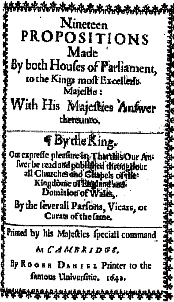| 1. Ministers serving on Charles' Privy Council must be approved by the House of Commons and the House of Lords. |
| 2. Matters that concern the public must be debated in Parliament, not decided based upon the advice of private advisors. |
| 3. That the Lord High Steward of England, Lord High Constable, Lord Chancellor, Lord Keeper of the Great Seal, Lord Treasurer, Lord Privy Seal, Earl Marshall, Lord Admiral, the Warden of the Cinque Ports, the Chief Governor of Ireland, the Chancellor of the Exchequer, Master of the Wards, the Secretaries of State, the two Chief Justices and Chief Baron, may always be chosen with the approbation of both Houses of Parliament; and in the intervals of Parliament, by assent of the major part of the Council, in such manner as is before expressed in the choice of councillor |
| 4. The education of the King's children is subject to Parliamentary approval. |
| 5. The King's children may not marry anyone without the consent of Parliament. |
| 6. Laws against Jesuits, Catholic priests, and Catholic recusants must be strictly enforced. |
| 7. The vote of Catholic Lords shall be taken away, and the children of Catholics must receive a Protestant education. |
| 8. A reformation of the Church government must be made. |
| 9. Charles will accept the ordering of the militia by the Lords and Commons. |
| 10. Members of Parliament who have been put out of office during the present session must be allowed to return. |
| 11. Councilors and judges must take an oath to maintain certain Parliamentary statutes. |
| 12. All judges and officers approved of by Parliament shall hold their posts on condition of good behavior. |
| 13. The justice of Parliament shall apply to all law-breakers, whether they are inside the country or have fled. |
| 14. Charles's pardon must be granted, unless both houses of Parliament object. |
| 15. Parliament must approve Charles' appointees for commanders of the forts and castles of the kingdom. |
| 16. The unnecessary military attachment guarding Charles must be discharged. |
| 17. The Kingdom will formalize its alliance with the Protestant states of the United Provinces (the Dutch) in order to defend them against the Pope and his followers. |
| 18. Charles must clear the five members of the House of Commons, along with Lord Kimbolton, of any wrongdoing. |
| 19. New peers of the House of Lords must be voted in by both Houses of Parliament. [5] |
